Twitter tags Trump tweet with fact-checking warning
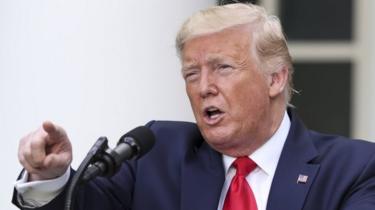 EPA
EPAA post by US President Donald Trump has been given a fact-check label by Twitter for the first time.
President Trump tweeted: "There is NO WAY (ZERO!) that Mail-In Ballots will be anything less than substantially fraudulent."
Twitter put a warning label under the post and a subsequent tweet under its new policy on misleading information.
Mr Trump responded by tweeting again, saying the social media giant "is completely stifling free speech".
Twitter's notification displays a blue exclamation mark underneath the tweets, suggesting readers "get the facts about mail-in ballots".
What is Twitter saying about Trump's posts?
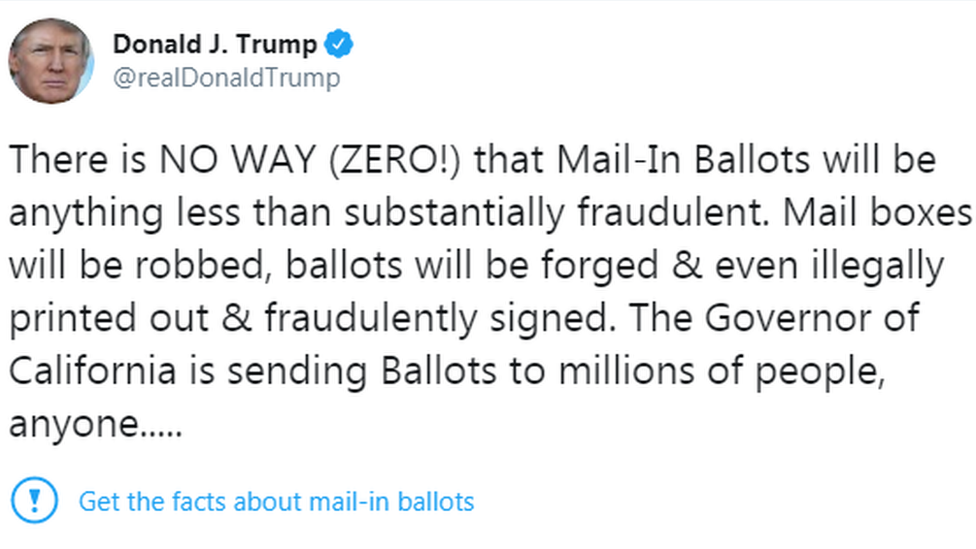 TWITTER
TWITTER
Twitter's link directs users to a page on which Mr Trump's claims about mail-in ballots are described as "unsubstantiated". The social media company cites reporting on the issue by CNN, the Washington Post and others.
This is followed by a "what you need to know" section where Twitter corrects what it says are false claims by the US president.
The social media company had pledged to increase the warning labels under false or misleading information on its site - but it has been slow to take steps against the US president.
Twitter updated its policies on warning labels early this month.
What is President Trump's response?
In his new tweets, Mr Trump accused Twitter of interfering in the US presidential election scheduled for 3 November 2020.
He said that the social media company was "completely stifling free speech, and I, as president, will not allow it to happen".
Mr Trump's presidential campaign manager Brad Parscale also criticised Twitter.
"Partnering with biased fake news 'fact checkers' is a smoke screen to lend Twitter's obvious political tactics false credibility. There are many reasons we pulled all our advertising from Twitter months ago, and clear political bias is one of them," Mr Parscale tweeted.

Only the first test for Twitter
Analysis by BBC's technology reporter Zoe Thomas
President Trump has used Twitter as a platform to pick fights with other politicians and celebrities. Now he may be in for a fight with the platform itself.
Following the firm's decision to label his tweets as misleading, he claimed on Twitter that the company was stifling free speech and that he wouldn't allow it. But Twitter as a private company gets to set its own rules for what happens on its platform.
The trouble for many was that up until Tuesday the firm didn't seem to be enforcing its rules when it came to the US president or other global leaders.
This is not the first time President Trump has made claims on Twitter that some say would have had less powerful people blocked from the site.
But Mr Trump's bombastic comments are part of what draws some of his more than 80 million followers to the site in the first place. The company doesn't want to lose them.
It sees the new labelling system as a way to balance both the desire to allow Twitter users including the president to say what they like, while also giving readers protection against misleading claims. The strategy mostly worked with tweets about Covid-19.
But with the US election in November, Twitter should expect a lot more posts with potentially misleading information. Meaning this is likely only the first test for its new enforcement plans.

What are mail-in ballots?
They are voting bulletins that are distributed and returned by post.
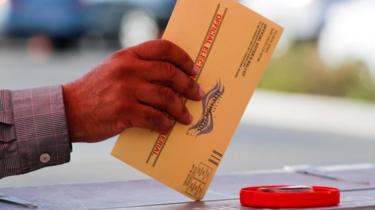 REUTERS
REUTERSIn a recent opinion survey conducted by the Pew Research Center, 66% of Americans said they would not be comfortable going to a polling place to cast their ballot during the current coronavirus outbreak.
Such concerns have increased pressure on states to expand the availability of mail-in ballots for all voters in order to minimise the risk of viral exposure from in-person voting.
While every state provides some form of remote voting, the requirements to qualify vary greatly.
Five states in the western US, including Washington, Oregon and Colorado, conduct their elections entirely via mail-in ballot.
Others, like California, provide a postal ballot to anyone who requests it.
On the other end of the spectrum, 17 states require voters to provide a valid reason why they are unable to vote in-person in order to qualify for an absentee ballot.
Twitter refuses to remove 'horrifying lies'
The move comes on the heels of Twitter's decision not to remove a comment President Trump made about the death of Lori Klausutis in 2001.
The president has tweeted several messages promoting a conspiracy theory that Ms Klausutis was murdered by MSNBC host Joe Scarborough.
Her widower Timothy Klausutis asked Twitter to remove the post, saying it included "horrifying lies".
The company declined to take down those tweets but told Mr Klausutis it was "deeply sorry" about the pain caused by the president's statements.
You may also be interested in

Features
Elsewhere on the BBC
Lyrics quiz
Have you been getting these songs wrong?
Feeling hot
What happens to your body in extreme heat?


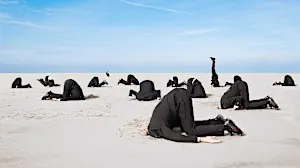
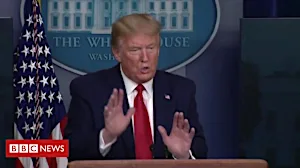














Comments
Post a Comment